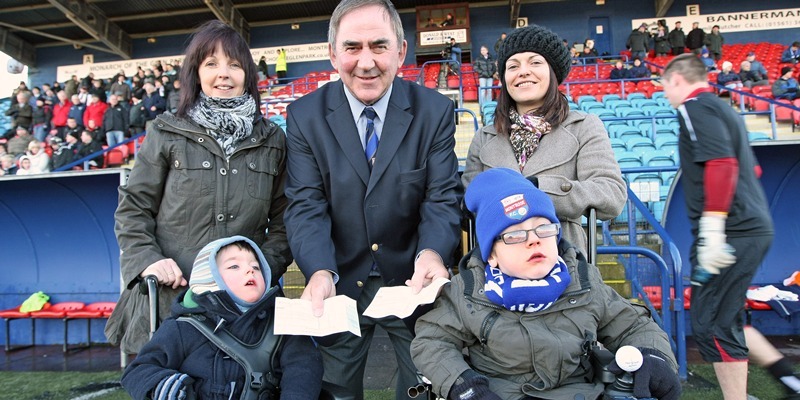Montrose FC have donated £600 to help the treatment of local boys Rhys Allan and Riley Murray.
The club took part in Movember, which challenges men to grow a moustache and raise money for prostate cancer awareness.
Of the sum raised, £300 was given to The Prostate Cancer Charity and £300 each to Rhys (3) and Riley (5), who were guests of the club along with their parents at Saturday’s fourth-round Scottish Cup clash against Dunfermline.
Rhys has cerebral palsy, and Riley was born prematurely after he and his twin, Brodie, were diagnosed with twin to twin transfusion at 20 weeks. Riley and Brodie were born 11 weeks premature and were given only a 30% chance of survival.
At 11 weeks old, Brodie underwent a hernia operation but never recovered from the anaesthetic, while the prognosis for Riley was not good and his parents Trudy and Dale were told there was a possibility he could not be able to see, feed, hear, walk or talk.
He has since amazed everyone with his progress and is enjoying school, although he is in need of a wheelchair costing £18,000.
The donation to Rhys’ trust will help his parents Gary and Penny meet the costs of his continuing care, which includes physiotherapy and regular trips to the specialist Craighalbert Centre in Cumbernauld.
Father Gary and mother Penny recently journeyed to Dusseldorf with the brave tot, where he was given stem cell treatment at the XCell Centre.’We can’t thank them enough’The family, who raised £20,000 so they could make the trip, was forced to travel to Europe as it has yet to get the go-ahead in the UK.
Penny said, “The money will help with the ongoing care of Rhys and we are also hoping to take him back to Germany.
“The costs of continuing care are expensive so we are very grateful to Montrose for everything they have done and we can’t thank them enough.”
Rhys was born with cerebral palsy and as a result cannot walk, use his hands or talk.
There is no treatment available for his condition in the UK, but the clinic in Germany has offered hope to Gary and Penny.
The treatment sees stem cells taken from bone marrow in the hip and implanted directly into the damaged areas of the brain.
Nearly 70% of patients treated this way see some improvement, sometimes within days, bringing with it a significant improvement to quality of life.
